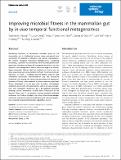| dc.contributor.author | Yaung, Stephanie J. | |
| dc.contributor.author | Deng, Luxue | |
| dc.contributor.author | Li, Ning | |
| dc.contributor.author | Braff, Jonathan L. | |
| dc.contributor.author | Church, George M. | |
| dc.contributor.author | Bry, Lynn | |
| dc.contributor.author | Wang, Harris H. | |
| dc.contributor.author | Gerber, Georg K. | |
| dc.date.accessioned | 2015-04-30T12:59:38Z | |
| dc.date.available | 2015-04-30T12:59:38Z | |
| dc.date.issued | 2015-03 | |
| dc.date.submitted | 2015-01 | |
| dc.identifier.issn | 1744-4292 | |
| dc.identifier.uri | http://hdl.handle.net/1721.1/96852 | |
| dc.description.abstract | Elucidating functions of commensal microbial genes in the mammalian gut is challenging because many commensals are recalcitrant to laboratory cultivation and genetic manipulation. We present Temporal FUnctional Metagenomics sequencing (TFUMseq), a platform to functionally mine bacterial genomes for genes that contribute to fitness of commensal bacteria in vivo. Our approach uses metagenomic DNA to construct large‐scale heterologous expression libraries that are tracked over time in vivo by deep sequencing and computational methods. To demonstrate our approach, we built a TFUMseq plasmid library using the gut commensal Bacteroides thetaiotaomicron (Bt) and introduced Escherichia coli carrying this library into germfree mice. Population dynamics of library clones revealed Bt genes conferring significant fitness advantages in E. coli over time, including carbohydrate utilization genes, with a Bt galactokinase central to early colonization, and subsequent dominance by a Bt glycoside hydrolase enabling sucrose metabolism coupled with co‐evolution of the plasmid library and E. coli genome driving increased galactose utilization. Our findings highlight the utility of functional metagenomics for engineering commensal bacteria with improved properties, including expanded colonization capabilities in vivo. | en_US |
| dc.description.sponsorship | National Science Foundation (U.S.). Graduate Research Fellowship | en_US |
| dc.description.sponsorship | Massachusetts Institute of Technology (Neurometrix Presidential Graduate Fellowship) | en_US |
| dc.language.iso | en_US | |
| dc.publisher | Nature Publishing Group | en_US |
| dc.relation.isversionof | http://dx.doi.org/10.15252/msb.20145866 | en_US |
| dc.rights | Creative Commons Attribution | en_US |
| dc.rights.uri | http://creativecommons.org/licenses/by/4.0/ | en_US |
| dc.source | Nature Publishing Group | en_US |
| dc.title | Improving microbial fitness in the mammalian gut by in vivo temporal functional metagenomics | en_US |
| dc.type | Article | en_US |
| dc.identifier.citation | Yaung, S. J., L. Deng, N. Li, J. L. Braff, G. M. Church, L. Bry, H. H. Wang, and G. K. Gerber. “Improving Microbial Fitness in the Mammalian Gut by in Vivo Temporal Functional Metagenomics.” Molecular Systems Biology 11, no. 3 (March 1, 2015): 788–788. | en_US |
| dc.contributor.department | Harvard University--MIT Division of Health Sciences and Technology | en_US |
| dc.contributor.mitauthor | Yaung, Stephanie J. | en_US |
| dc.relation.journal | Molecular Systems Biology | en_US |
| dc.eprint.version | Final published version | en_US |
| dc.type.uri | http://purl.org/eprint/type/JournalArticle | en_US |
| eprint.status | http://purl.org/eprint/status/PeerReviewed | en_US |
| dspace.orderedauthors | Yaung, S. J.; Deng, L.; Li, N.; Braff, J. L.; Church, G. M.; Bry, L.; Wang, H. H.; Gerber, G. K. | en_US |
| dc.identifier.orcid | https://orcid.org/0000-0003-4203-2505 | |
| mit.license | PUBLISHER_CC | en_US |
| mit.metadata.status | Complete | |
